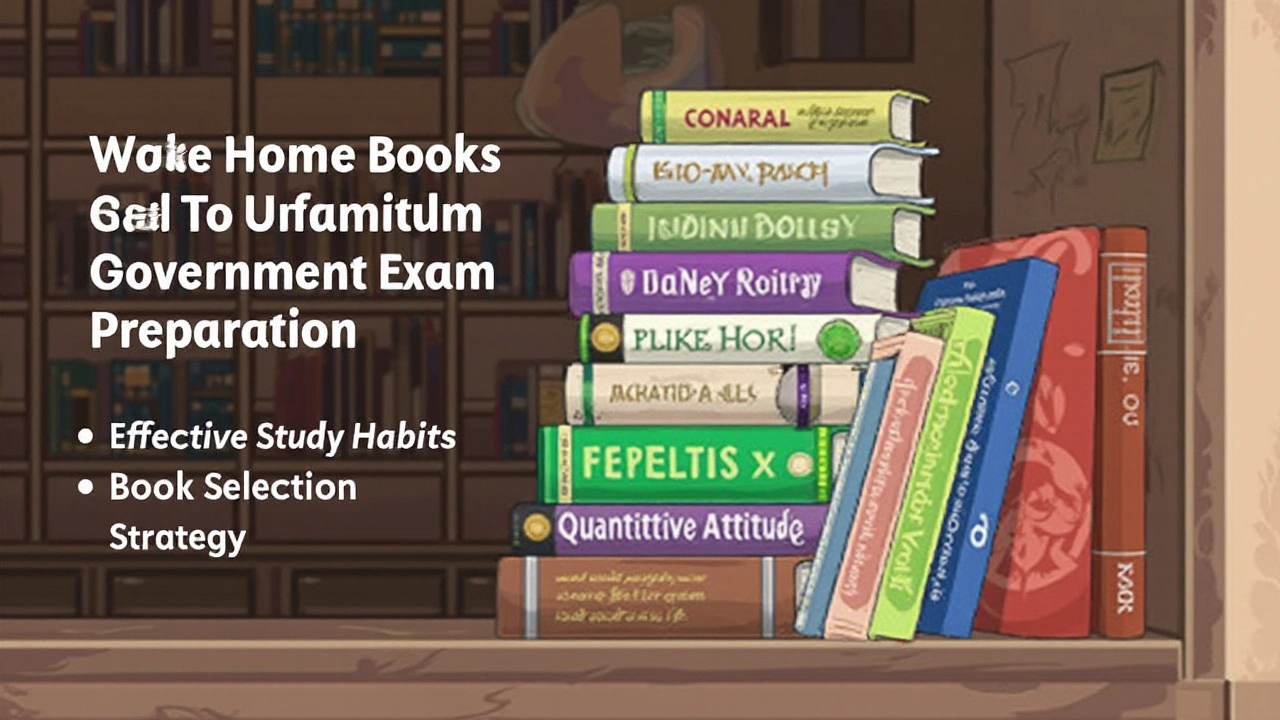
Aspiring to work in the public sector is a dream that many nurture. Despite the challenges, the promises of job security and serving the community are strong motivators. But the path to getting a government job is lined with competitive exams that one must conquer.
To succeed, selecting the right study materials is a vital step in your preparation strategy. There is an ocean of books available, but making the best choice can often feel like searching for a needle in a haystack. This article simplifies your journey by shedding light on books that have helped many in achieving their goal. Let's take a closer look at how to choose the optimal study companions for your government job preparation journey.
- Understanding Government Job Exams
- Criteria for Choosing the Right Book
- Top Recommended Books
- Subject-Specific Picks
- Supplementary Resources
- Study Tips & Techniques
Understanding Government Job Exams
Preparing for a government job requires more than just ambition; it demands a thorough understanding of the exam landscape. These exams are meticulously designed to assess a candidate's proficiency across various domains including aptitude, knowledge, and sometimes specific skills related to the job role in question. Planning to sit for one? You need to first acclimate yourself with the type of exams conducted by different government bodies.
In India, for instance, examinations like the UPSC Civil Services, Staff Selection Commission (SSC), and Banking exams like IBPS and SBI Recruitments are well known. Each exam has its dedicated syllabus, covering subjects such as General Knowledge, Reasoning, Quantitative Aptitude, English Language, and depending on the job, sometimes Professional Knowledge. The competitive nature of these exams is undeniable, with a large number of candidates vying for a limited number of positions.
"The Indian government exams are one of the toughest globally, testing not just academic knowledge but patience and perseverance of the candidates," commented Dr. Rajesh Sharma, an acclaimed educator and author in the domain of competitive exams.
Understanding the syllabus deeply and having a strategy to cover it comprehensively can set you apart from other aspirants. Some exams also have a second tier involving interviews or skill tests, necessitating a holistic approach to preparation. The preliminary stage often involves objective-type questions, while the main examination becomes a bit more rigorous with descriptive questions, requiring candidates to pen down their thoughts clearly and concisely.
Categories and Patterns
Examination patterns often entail multiple stages, each eliminating a fraction of candidates and bringing the cream of the crop a step closer to their dream job. The prominence of negative marking in many cases makes each test even more challenging. This means one cannot indulge in guesswork recklessly, as a wrong answer could negate a right one. It's crucial to go through previous years' papers and mock tests to understand the pattern and the difficulty level one can expect during the actual exams.
Aspirants should familiarize themselves with various categories of exams they are eligible for based on their educational qualifications. While some jobs may only require a high school diploma, others may necessitate a specialized degree. Many competitive exams also provide reservations or certain benefits to different categories such as SC/ST/OBC or persons with disability. Knowing where you stand and the rules pertinent to your case can help immensely.
| Exam | Applicants Per Year | Passing Rate |
|---|---|---|
| UPSC Civil Services | Over 1 million | 0.1% |
| SSC CGL | Approximately 2.5 million | 1.7% |
The competition can be intense, and understanding the nature of these exams can give candidates a strategic advantage. Prepare with vigor, utilize the right books, and position yourself among the finest with diligent and smart preparation.
Criteria for Choosing the Right Book
When you set out on the journey to conquer government job exams, picking the right books is akin to gathering the right tools for a mission. How do you ensure these books are the most effective for your goals? It involves a careful evaluation of several factors that intertwine knowledge, practicality, and strategy. Each exam has its own unique pattern, requiring you to align your resources accordingly. First, examine the book's alignment with the exam's syllabic structure. A thoroughly detailed yet concise coverage of topics ensures that you've drilled down to the nitty-gritty essentials. Books often acclaimed by successful candidates and experts in the field can serve as a reliable beacon, steering you away from materials that may lead you astray.
Another factor to consider is the author's expertise and the book's publication credibility. Those who have ridden the same path or educators specializing in the domain lend an air of authenticity and clarity to the content. They understand where aspirants usually trip and hence, tailor their books to pre-emptively address such stumbling blocks. Their books often include value-added content like mock tests, past question papers, and adaptive practice exercises that replicate the exam environment, readying you for the mental exertion to come. Books enriched with such interactive elements score higher on usability and engagement.
Pay attention to the book's readability, too. Complex jargon shouldn't act as a barrier but rather as a doorway to gaining deeper insight. Simplification of concepts without dry academic verbosity often differentiates a good book from a great one. A pedagogically sound book will gradually build on fundamental concepts before venturing into complex territories. This learning scaffold not only makes the study process enjoyable but immensely effective. A balance between detailed explanations and précised points enhances retention and comprehension.
Lastly, consider the book's relevancy to current patterns and updates. With regular changes in exam formats or topics of significance, an outdated book can put you in a precarious position. Timely updates and revisions in a book reflect its reliability and the author's commitment to lender efficacy. Keep an eye out for editions that incorporate recent developments in government job recruitment policies.
To quote the renowned educator John Hattie,
"Effective study hinges not just on what you learn but how you learn and what resources you choose."His words highlight the strategic dimension to academic success, emphasizing that your materials should complement an active, inquiry-based approach to preparing. Paying attention to these criteria can transform a daunting study regime into an informed, streamlined strategy for success.

Top Recommended Books
For those aiming to secure a position in the government sector, the choice of study material is crucial. Selecting the right book can provide clarity, deepen understanding, and enhance one's ability to solve complex problems. Some books stand out due to their comprehensive coverage of exam syllabi, thoughtful explanations, and practice exercises that mirror the real test scenarios.
One of the most esteemed books for government job aspirants is 'General Studies' by Manohar Pandey. It's revered for its thoroughness and clarity and covers topics ranging from geography to polity in an easily digestible manner. The book's layout allows readers to scan through essentials quickly and offers detailed explanations where needed, making it an invaluable asset for understanding core concepts.
Another popular choice is 'Fast Track Objective Arithmetic' by Rajesh Verma. Arithmetic often becomes a stumbling block, but this book's approach demystifies mathematical principles through engaging examples and practice questions. The step-by-step solutions teach effective problem-solving techniques, bridging the gap between confusion and clarity. This makes it ideal for mastering the quantitative section of government exams, especially when speed and accuracy are paramount.
In the realm of reasoning, 'A Modern Approach to Verbal and Non-Verbal Reasoning' by R.S. Aggarwal takes the crown. This book's widespread acclaim stems from its detailed classification of reasoning questions, spanning both verbal and non-verbal categories. What makes it particularly valuable are the hints and tips shared alongside the exercises, encouraging readers to approach problems with innovative strategies.
'Books don't just go with you, they take you where you've never been.' – Test Dynamic
For English language preparation, consider 'Word Power Made Easy' by Norman Lewis. Its rigorous vocabulary drills and engaging exercises make the learning process memorable. The book isn't just a vocabulary builder; it's a confidence booster, preparing you to face language-related challenges head-on.
Sometimes lists help distill key information for quicker decision-making. Here's how you might consider determining the right book for your needs:
- Identify your weak areas and choose books that offer practice exercises in those sections.
- Consider the book’s previous success stories by consulting reviews and user feedback.
- Check if the book offers mock exams and practice questions that reflect actual tests.
- Ensure the book is updated with the latest exam pattern and syllabus.
By selecting books that are not just authoritative but also engaging, you're setting yourself up for success in the fiercely competitive government job environment. Investing in the right materials not only paves the way for mastering exam content but also boosts confidence as the exam day approaches.
Subject-Specific Picks
When preparing for government jobs examinations, it becomes imperative to tailor your study approach to meet the demands of the specific subjects you will encounter. For instance, one might need to cover areas like Quantitative Aptitude, General Knowledge, English Language, and Logical Reasoning, each posing unique challenges. A tailored approach involves selecting books that delve deeply into each subject while also offering comprehensive explanations and practice questions. Take Quantitative Aptitude: a classic recommendation is R.S. Aggarwal’s "Quantitative Aptitude for Competitive Examinations." It’s a stalwart in the study community, known for its exhaustive coverage and myriad practice problems that help polish computation skills.
The General Knowledge section is another key area, often influenced by current affairs and regional specifics. Manorama Yearbook stands as a worthy companion in this regard. It offers updated facts and figures that aid aspirants in keeping abreast with world happenings. Aligning with this, aspiring candidates should also consider "Lucent's General Knowledge," a book known for its succinct yet thorough presentations of facts across history, geography, polity, and more.
For those venturing into the intricacies of the English Language, having a solid command is essential, often impacting not just written tests but interviews as well. "Wren & Martin’s High School English Grammar & Composition" is a staple choice for enthusiasts, offering clear explanations of grammatical nuances. Complementing this, "Word Power Made Easy" by Norman Lewis can help in expanding your vocabulary with strategic exercises. As Lewis himself stated,
"Vocabulary can be seen as the strongest indicator of success or failure."
Logical Reasoning and Analytical Ability do not fall behind in importance, carrying significant weight especially in administrative job examinations. Books such as "A Modern Approach to Verbal & Non-Verbal Reasoning" by R.S. Aggarwal provide a comprehensive look into both categories of reasoning, offering a variety of questions designed to build and test your logical prowess. Aspiring candidates should incorporate regular practice from these books into their routine.
The effective use of these study books involves incorporating them into a structured plan, acknowledging each subject's peculiarities. Creating that synergy between the recommended texts and a robust study schedule will boost your preparation, drawing you closer to the success you desire in government jobs. Embracing this approach equips you with the tools to navigate the multifaceted examination landscape with confidence and insight.

Supplementary Resources
In today's fast-paced world, relying solely on books for government job exam preparation may not be enough. To gain an edge, it's imperative to utilize additional resources that complement and enhance your learning experience. Online platforms have become treasure troves of information, offering mock tests, video lectures, and interactive modules that are tailored for different exams. Platforms such as Khan Academy, Coursera, and Udemy offer courses specifically designed for competitive exam takers, which can provide you with diverse perspectives and teaching styles. These resources can bolster your preparation without burning a hole in your pocket.
One interesting way to keep your knowledge updated is by subscribing to popular educational YouTube channels where seasoned educators share valuable insights and exam-taking strategies. These videos often include tips on time management, eliminating guesswork in multiple-choice questions, and memory tricks to retain complex information more effectively. Also, numerous channels provide summarized content that highlights key points from critical subjects, which is a smart way to revise before the examinations. This helps break the monotony of textbook reading, making the entire process more engaging and less stressful.
Engaging with community forums like Quora or Reddit can also offer you practical advice from peers and mentors who are in the same boat or have successfully sailed it. It's a great way to feel part of a community and have your questions answered by those who might have insights you did not even consider. Participation in such communities may also reveal unknown resources or techniques that could be pivotal in your success. As Neil Gaiman once said,
“The best way to become something is to do something.”Immerse yourself in these communities—they're often as enlightening as they are supportive.
Don't underestimate the power of mobile applications specifically crafted for exam preparation. Apps like Gradeup and Unacademy not only provide unlimited practice questions but also track your progress through the multitude of quizzes available. This real-time feedback allows you to identify weak areas and invest time in honing those skills. Using such apps can make daily commuting time productive, turning every moment into a learning opportunity. Moreover, many apps can customize daily practice routines just for you, reinforcing the 'practice makes perfect' mantra.
Newspapers and magazines remain stalwarts for keeping abreast of current affairs, a critical aspect often tested in government jobs. While online articles are convenient, they can sometimes miss the depth offered by established publications like The Hindu or Yojana Magazine. These resources delve into various topics that are often discussed in exams, thereby expanding your knowledge base. A tip many toppers suggest is to not only read these publications but to also maintain a diary to jot down key points. This develops a habit of summarizing information in your own words, which leads to better retention.
Lastly, study groups can work wonders by offering a diversified way to understand complex subjects. Connecting with a group of like-minded individuals fosters an environment where you can learn and teach simultaneously. It is often said that teaching is the best form of learning. Face-to-face discussions, whether physical or virtual, encourage critical thinking and often reveal different interpretations of the same information. Create a rhythm for regular meetings and set agendas that ensure productive sessions.
Study Tips & Techniques
Preparing for a government job exam requires more than just reading the right books. It demands a strategic approach toward studying that makes the most of your time and efforts. One effective study technique is the Pomodoro Technique, which involves breaking down your study time into 25-minute focused intervals with short breaks in between. This technique not only prevents burnout but also enhances concentration, allowing your brain to better retain information. To keep track of these intervals, plenty of apps are available, which can help in maintaining the discipline required for such an approach.
Another tip is to engage in active reading rather than passive reading. This means asking questions while you read, jotting down notes, and summarizing the information in your own words. By actively engaging with the material, you tend to understand and remember it better. It can be particularly useful to form study groups where you and your peers can discuss various topics. This not only offers a platform to tackle challenging subjects together but also provides an opportunity to hear different perspectives, which can deepen your understanding.
Mock tests are your best friend in this journey. Regularly taking these tests simulates an exam-like environment, helping you manage time effectively and identify weak points to focus on. Many successful candidates recommend setting aside at least one day a week exclusively for taking and analyzing mock tests. The analysis is critical as it tells you where you stand and which areas need improvement. Be sure to incorporate relaxing activities and maintain a healthy lifestyle to keep stress at bay.
You might find yourself overwhelmed by the vast syllabus and unsure of where to start. Establishing a study plan from the get-go can provide structure to your preparation. A proven method is to start with subjects you find difficult or unfamiliar, allowing more time to develop an understanding. An organized schedule not only builds discipline but also ensures that you cover every topic within the stipulated time. Remember to keep your schedule flexible to adapt to unforeseen circumstances.
"Plans are of little importance, but planning is essential." — Winston Churchill
Finally, don't underestimate the importance of self-care during this rigorous preparation phase. Regular exercise, adequate sleep, and a balanced diet are fundamental to keeping your mind sharp and ready to absorb new information. Consider meditation or yoga to calm any exam jitters and enhance focus. Remember, while your goal is to secure a job in the government sector, your well-being is equally important. Balancing study with self-care leads to a more effective study session, paving the way for success.




